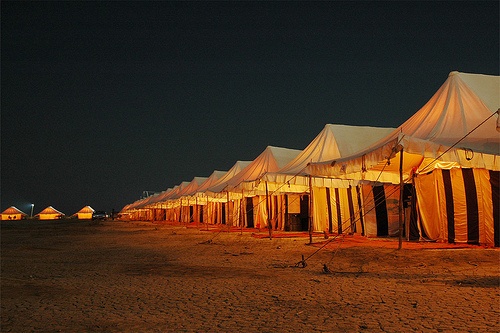by Coolaid Armstrange
Publisher/Editor
While tent cities are known as temporary housing for the homeless, OPALITE Land Trust is developing a new direction for the concept: high-quality, affordable living spaces.
“Tents have come a long way in terms of durability,” said Lisel Byway, executive director for the land trust. “Our commitment has always been to providing our island community with quality affordable housing, and we feel that a tent city creates sustainable living for groups of like-minded people.”
The communal housing development is slated to go on the airport land next to the dog park. (For a story about the Home Depot being built on the same stretch of land, see page 10.)
The tent city, which is tentatively being called Camp Green Hope, will have a large community garden, a bathroom, shower and pool building and a commercial kitchen facility. The tents will be made of strong canvas and can have up to three rooms plus a spacious living area.
“As we are running out of available land to create stick-built homes, this is the perfect solution,” Byway said. “The tent fabric has a 100-year lifespan so these tents will serve many generations of dwellers, and when the fabric fades it can be recycled to provide habitat for cultivating mushrooms.”
Byway hopes the mushrooms will be sold through the local food co-op.
County to prohibit vacation rentals
A local advocacy group has made major headway in the uphill battle of affordable housing in the San Juans. Starting April 2016, all rentals in the county can only be used for long-term housing.
On April 1, a group called “Land for All” won a lawsuit against San Juan County. Citing a need to preserve the island fabric for future generations, the Washington State Growth Management Board ruled in favor of the group. Any new homeowners renting their house out to vacationers will be fined $500 per day for noncompliance.
The lawsuit read: “Second homes and accessory dwelling units are primarily set up as vacation houses. Young people, families and seniors have an incredibly hard time finding a place to rent. The very people who are the heartbeat of this community are unable to live here. People are forced to live in substandard homes, vehicles, tents – or they simply leave the island.”
In addition to prohibiting new vacation rentals, if the long-term rental has one bedroom and bathroom, homeowners cannot charge more than $750. If the house has multiple rooms, the rent cap is set at $1,600. Monthly inspections will be conducted to ensure safe living conditions.
“This still allows existing homeowners to keep their operations open but will slow down the trend of forcing out working families,” wrote the ruling judge on the growth management board.



